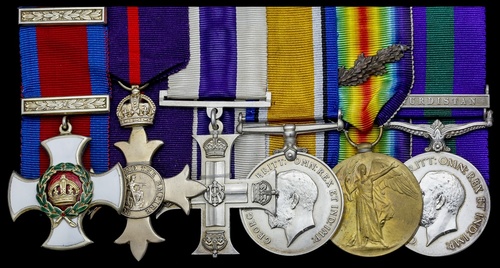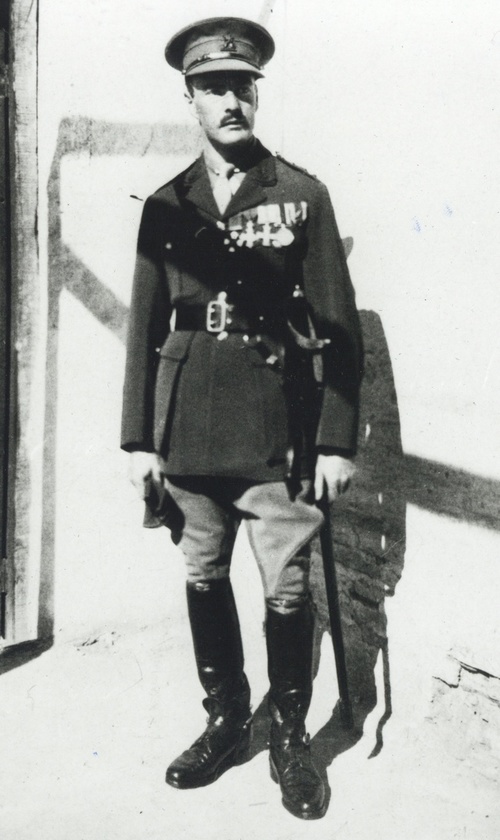Auction: 17002 - Orders, Decorations and Medals
Lot: 364
(x) A fine Great War D.S.O., M.C. and inter-war Iraq operations O.B.E. group of six awarded to Captain & Adjutant G. V. Taylor, Federated Malay States Volunteer Force, late Rifle Brigade and Norfolk Regiment
Having won a 'mention' for his gallant service as a recently commissioned subaltern in the 16th (Service) Battalion (St. Pancras), The Rifle Brigade, on the Somme in September 1916, he rose to the temporary command of the same battalion in May 1918, following atrocious losses suffered in the German Spring Offensive: it was for these operations that he won his D.S.O., whilst his M.C. was likely awarded for gallant work in the Third Battle of Ypres
Distinguished Service Order, G.V.R., silver-gilt and enamel; The Most Excellent Order of the British Empire, O.B.E. (Military), Officer's 1st type breast badge, silver-gilt and enamel, hallmarks for London 1919; Military Cross, G.V.R., unnamed as issued; British War and Victory Medals, M.I.D. oak leaf (Lt. Col. G. V. Taylor); General Service 1918-62, 1 clasp, Kurdistan (Capt. G. V. Taylor), generally good very fine (6)
D.S.O. London Gazette 3 June 1919.
O.B.E. London Gazette 2 June 1923.
M.C. London Gazette 1 January 1918.
George Vere Taylor, who was born in Highgate, London on 28 August 1887, served in the ranks of the mobilised Territorial Force until June 1915, when he was commissioned 2nd Lieutenant in the Rifle Brigade.
Gallant leadership on the Somme
Drafted to the 16th (Service) Battalion (St. Pancras), he first went out to France in March 1916, and remained actively employed in that theatre of war until the end of hostilities, including a stint as Adjutant of the unit from September 1916 until February 1918. During the same period he saw considerable action on the Somme, the Battalion taking several hundred casualties after costly attacks north of Ancre on 3 September 1916 and on the Stuff Redoubt in the following month. For his own part, Taylor was specially commended by his C.O. for his actions on the 3 September:
'In spite of a very heavy barrage of large calibre, he helped me organise the 11.05 attack and by himself started off the 11.30 attack.'
Taylor was advanced to Captain and mentioned in despatches (London Gazette 4 January 1917, refers).
Ypres and beyond
His subsequent award of the M.C. almost certainly reflected gallant service in the Third Battle of Ypres, most likely at Pilckem Ridge or Langemarck in August 1917, whilst his D.S.O. likely stemmed from gallant deeds at the time of the German Spring Offensive in March-April 1918: his battalion was all but wiped out at the commencement of the German onslaught at the end of March, when following severe fighting at Hangard its strength was reduced to just two officers and 114 other ranks.
Notwithstanding such severe punishment, these survivors - as part of a composite battalion - served with notable courage in the Ypres salient in mid-to-late April, including a successful counter-attack on Wyschaete Ridge and participation in the determined defence of Vermezete: Taylor subsequently held temporary command of the remnants of his battalion in the period May-July 1918.
Invested with his D.S.O. by Prince Arthur of Connaught at St. James's Palace on 22 October 1919, he was also the recipient of a second 'mention' (London Gazette 9 July 1919, refers). He relinquished his commission in September 1921.
Iraq and the Far East
Early in the following year, however, he was re-commissioned in the rank of Captain in the Norfolk Regiment and he went out to Iraq as a G.S.O. III. He remained actively employed in the same theatre of operations until September 1926, including a period of attachment to the R.A.F. and served latterly as D.A.A. & Q.M.G. He was awarded the O.B.E.
In November 1928, Taylor gained appointment as Captain & Adjutant of the Federated Malay States Volunteer Force (F.M.S.V.F.) and the Malay States Volunteer Rifles (M.S.V.R.). It was a happy appointment, the M.S.V.R. winning the Straits Trading Cup on the rifle range and the Lewis Gun Cup in quick succession and, in the summer of 1931, he was appointed Brigade Major of the F.M.S.V.F.
Sadly, however, his long overdue promotion proved to be short-lived for, on account of ill-health, he was compelled to return to the U.K. He died at Mount Vernon Hospital, Northwood, Middlesex in February 1932; sold with an extensive file of copied research.
Subject to 5% tax on Hammer Price in addition to 20% VAT on Buyer’s Premium. For more information please view Terms and Conditions for Buyers.
Sold for
£4,000







